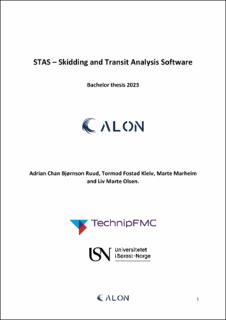| dc.description.abstract | For offshore operations, heavy subsea equipment needs to be transported from one location to another by ship. This type of operation is called Skidding and Transit and is used for subsea equipment that is too large or too heavy to be lifted by crane.
Skidding is the operational phase of the activity and is when the equipment needs to be transported from one location to another on a vessel. Transit is when the equipment is not being skidded or operated subsea and is parked in an appropriate location on the vessel.
For skidding and transit, there are several factors that need to be taken into consideration. This includes collection of data of how the vessel, whether it is a ship or an oil rig, moves in correlation to the waves at present location. Mathematical modelling is used to see what forces are working on the equipment, and if the timeframe for operations is inside or outside the weather window, in terms of safety.
For skidding and transit analysis, one either must do these types of calculations manually or use software tools that are expensive and requires training to use. The purpose of this project is to create an application to eliminate the use of commercial software and optimize the presentation of driving factors for the capacity of the equipment.
This application provides a baseline for this type of analysis in the offshore industry. For further development of this software, one needs to explore the possibilities for implementation of analysis based on an irregular wave pattern. | en_US |
